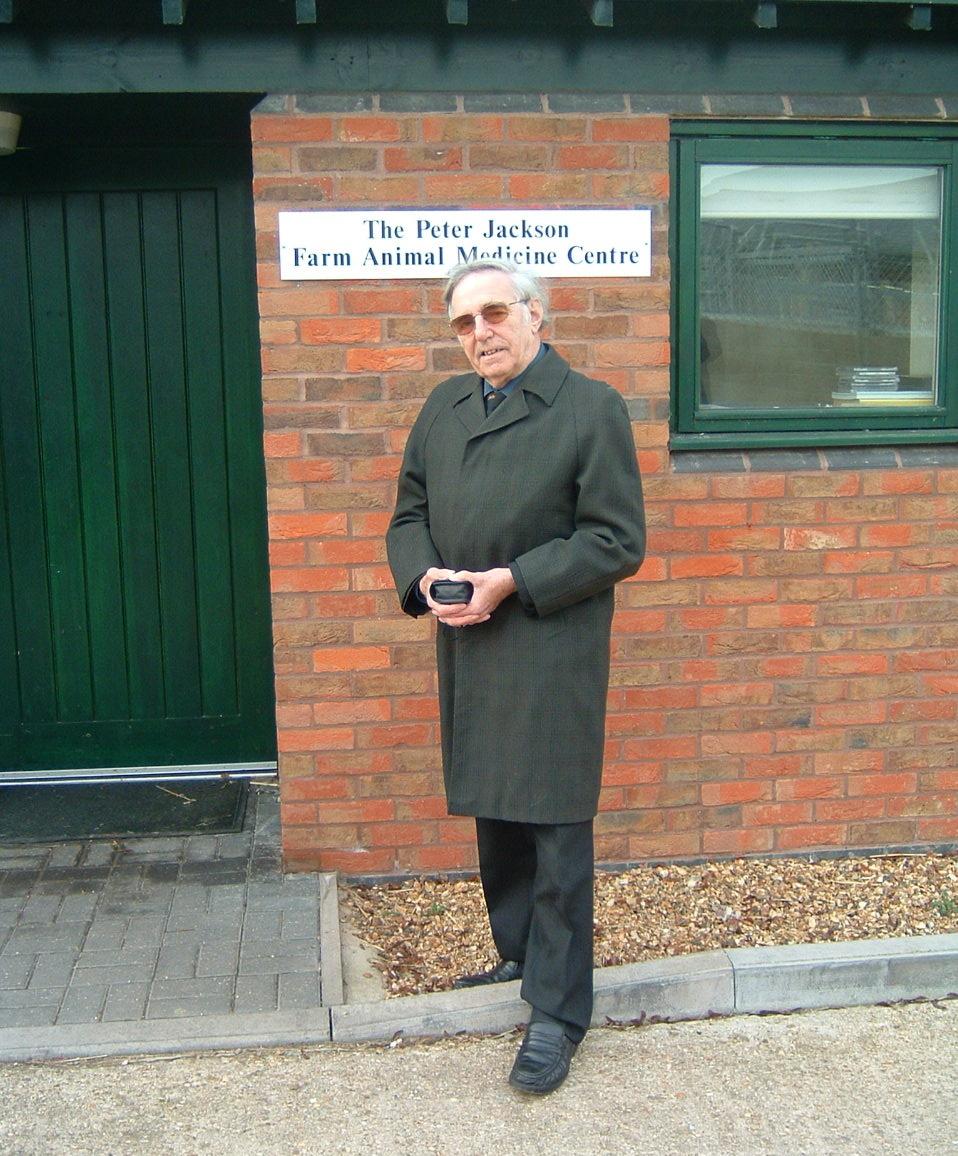
Submitted by Anonymous on Mon, 05/06/2023 - 10:37
PETER JACKSON
For those who knew Peter, he was a quiet, gentle, self-effacing person who had a steely resolve that drove him to achieve great things during his life. It was with great sadness that we learnt of his death on 14th May 2023.
Peter was born on 1st October 1936 in Welling, Kent. When war was declared in 1939, his father joined the Royal Navy and his mother took up a teaching role at Teversham Junior School near Cambridge. Just after the war, the family moved to Babraham, close to Babraham Hall and Park which had been sold to the Government and became the Institute of Animal Physiology. This association was to stimulate Peter’s interest in farm animals and veterinary medicine.
Peter attended the Perse School before applying to Royal (Dick) Veterinary School in Edinburgh for a place to study veterinary medicine. Peter graduated with honours and several medals in 1960 before joining a mixed rural practice in March, Cambridgeshire. Peter, like many practitioners, took a great pride in providing an excellent service to his clients and patients. His description of practice in the Fens at that time was a reminder of a bygone era. It was here that he met Ronnie, who was to become his wife and who supported and encouraged him throughout his life. Peter achieved the rare distinction of achieving the Fellowship of the Royal College of Veterinary Surgeons by thesis from practice. For his thesis on dystocia in sows, he had spent many hours studying numerous farrowing events on Fenland farms. Peter’s enthusiasm and enquiring mind enabled him to move from private practice to academia when he developed chronic back pain. He accepted a lectureship in obstetrics at the Royal (Dick) in 1976, which required his family to move to Penicuik close to Edinburgh.
In 1980, he was encouraged to apply for a new senior position at the Veterinary School in Cambridge. He was appointed University Physician, a unique Cambridge title at Readership level. He concentrated mainly on large animals but still took his turn at the RSPCA Clinic working with companion animals. He was instrumental in introducing diagnostic ultrasound and endoscopy into the veterinary curriculum. Having gained his Fellowship by thesis from practice, he embarked on a professional doctoral thesis on bovine dystocia. He was awarded a Winston Churchill Travelling Scholarship in 1982, which enabled him to visit many of the top Vet Schools in Europe in order to understand and study their approach to bovine dystocia. He graduated as Doctor of Veterinary Medicine & Surgery in Edinburgh in 1985. As veterinary medicine became more specialised, Peter concentrated more on farm animal medicine and reproduction. His didactic teaching was always accompanied with beautifully illustrated notes, which he turned into several very successful textbooks. He will always be remembered for his compassion and dedication to the individual animal at a time of progressive intensification within farming. It was with great sense of loss that Peter decided to take early retirement in 2002. He was delighted to have the new Farm Animal Unit named in his honour in 2004.
In 1981, Tony Palmer had asked Peter whether he would be interested in becoming a senior member at St Edmund’s House (full College status came later). The Rev John Coventry SJ was the Master at that time. The friendly and supportive ethos of the College fitted well with Peter’s ideals. He was invited to become a Fellow of St Edmund’s College in 1990 under the new Mastership of Dr Richard Laws. He was soon appointed Director of Studies for Clinical Veterinary Medicine in 1992, a position he held until 2005. Peter’s patient, sympathetic demeanour made him an ideal person to act as a College Tutor which he did admirably and diligently for generations of students until 2002 when the then Master, Sir Brian Heap, approached him to become Senior Tutor. He accepted what was now becoming a much more formal and time-consuming role with increased administration due to the growth of the College. He was very ably supported by the experienced Helen Mason as Deputy Senior Tutor. The College continued to grow and flourish under his tutorial leadership and, as Sir Brian has commented, ‘he carried his new responsibilities with immense care and sympathy for students consistent with his longstanding commitment to the life and success of the College. Characteristically, he once shared with a small gathering of Fellows that he had never expected to ascend to such a position’. Peter was elected an Emeritus Fellow in 2006.
Outside the Vet School and College, he had been President of the Eastern Counties Veterinary Society and an elected member of the Council of the British Veterinary Association. He was a Trustee of Wood Green Animal Shelters and a member and chair of the RSPCA Farm Livestock Advisory Committee. He received a number of national accolades for his work from the RCVS and BVA. Peter authored a number of successful veterinary textbooks, which have been translated into a number of different languages as well as writing books on veterinary history and an autobiography entitled ‘Times Past and Present (An unashamedly honest account of a life spent following a diverse career in the veterinary profession)’.
In his later years, he and his wife moved from their small holding in Over to Wisbech to be nearer their family. Peter’s passing is an immense loss to the veterinary profession and to St Edmund’s College. He will be greatly missed. Our sympathies go to Ronnie, their two daughters, Lucy and Libby, and their families for their profound loss.
Mike Herrtage, Tony Palmer and Brian Heap
